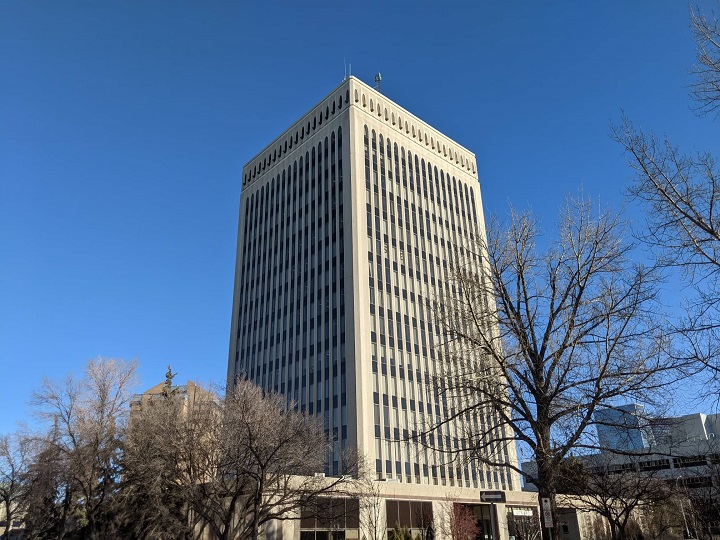CUPE 21 is looking to overturn a decision made involving the Workers’ Compensation Board (WCB) and the City of Regina regarding seeking damages due to workplace sexual harassment.

“It’s problematic on a number of fronts from my perspective and obviously from others as well,” said Jill Arnott, executive director for the Regina Women’s Centre.
The union filed an application with the Court of King’s Bench to reverse the decision, saying that the WCB agreed with the city’s request that workers are barred from seeking money in regards to section 40 of the Saskatchewan Human Rights Code.
Arnott said this stemmed from one situation, but noted that the city’s own harassment policy says remedies can obtained through the human right code.
“This policy does not restrict or inhibit the right of employees to access other remedies available through the collective bargaining agreements, The Saskatchewan Human Rights Code, The Saskatchewan Employment Act, Workers’ Compensation Board, Saskatchewan Labour, or from seeking independent legal advice,” the City of Regina’s harassment policy reads.
Section 40 of the human rights code states a person could receive a maximum of $20,000 in compensation.
“…the court may order the person who has contravened or is contravening that provision to pay any compensation to the person injured by that contravention that the court may
determine, to a maximum of $20,000, if the court finds that a person has wilfully and recklessly contravened or is wilfully and recklessly contravening this Act or any other Act administered by the commission; or the person injured by a contravention of this Act or any other Act administered by the commission has suffered with respect to dignity, feelings or self-respect as a result of the contravention,” the human rights code reads.
Arnott said it’s not uncommon for damages to be paid out through the Saskatchewan Human Rights Code, noting that this system has been going on for a long time.
She added this is not a new situation and wonders why the city and WCB came to this decision now.
“Why are you seeking to restrict that now, after all this time? Is it because we’re at a cultural moment where people are coming forward more, because of our cultural environment?”
She suggested that this situation reads like this is something that’s becoming costly, and the city is looking to curb access to remedy.
“If you are recognizing in your institution that this is a problem, enough of a problem that you would seek to curb access to remedy, then why wouldn’t you just be proactive?”
The release sent by CUPE 21 said harassment based on a number of characteristics is an ongoing issue facing the union and the City of Regina outside workers.
It noted that if this decision is allowed to stand it will set a precedent that workers across Saskatchewan won’t have full access to remedies under the human rights code.
Arnott said instead of stopping an employee from seeking damages, they should work to create a culture where sexual harassment is not an issue in the workplace.
“That’s like the cornerstone of what it means to be Canadian, right, is this human rights. It’s what we hold up as the ideals of who we are as a people. And when our human rights are up for grabs? I feel deeply uncomfortable with that, and I feel everyone should be deeply uncomfortable with that.”
She said better is possible, though, noting that the city should be looking to call in experts to help change their workplace culture so they don’t have to write another policy or pay out money.
“Businesses thrive when they focus more on creating a culture of belonging, including their bottom line. Businesses are about money, so even just on that front you’ll be more productive if your workers feel safe, feel valued, feel like they belong to the culture that they are producing for.”
Arnott suggested that businesses listen to their employees and pinpoint areas where there seems to be significant trouble, noting that workers could be facing different kinds of discrimination.
“We look for where we can find biases and explore what those are, bring people in to have those tough conversations.”
“Tap the experts, ask for help, make it a priority,” Arnott added.
The court date is set for March 9th, and the release said five organizations will be heard, including Saskatchewan Federation of Labour, Regina District Labour Council, Retail Wholesale & Department Store Union Saskatchewan Joint Board, Saskatchewan Government Employees Union and the Saskatchewan Human Rights Commission.
Global News reached out to the City of Regina for a response and received a statement.
“The City of Regina’s top priority is the health and safety of its employees and residents, which includes protecting each employee’s dignity and self-respect in the workplace. The City is proud to work in collaboration with Unions representing its employees to create a respectful workplace and to appropriately respond to any situation where harm may have been reported.”
“We are pleased with the recent decision of the Workers’ Compensation Board, and we respect the union’s right to challenge the decision in court. As legal proceedings occur, the City of Regina will continue to work alongside unions to ensure every employee enjoys a safe, respectful workplace,” the statement read.







Comments